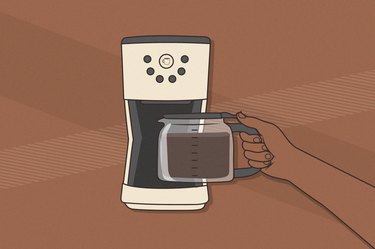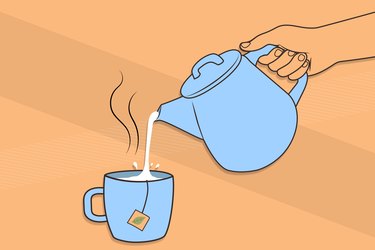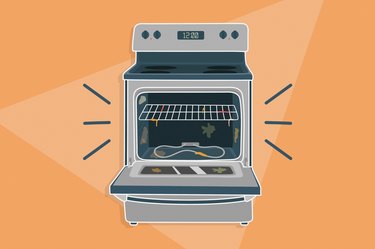
If your coffee machine is your favorite kitchen appliance, it may be high time to give it a deep clean. While they may not look dirty, coffee makers do require upkeep. But… how much? And why?
We asked coffee pros and a food safety expert to answer the burning question: How bad is it really to never clean your coffee maker? Here's what we learned.
Video of the Day
Video of the Day
Why You Should Clean Your Coffee Machine
There are a handful of reasons to clean your coffee maker regularly. Not only does a clean machine mean less risk for contamination, but it also brews a better cup of joe.
Before we dive in, it's important to make the distinction between cleaning your coffee accouterments (think: rinsing your used coffee pot with warm, soapy water) and descaling the coffee machine itself.
"Descaling is the removal of limescale buildup," says Jenna Gotthelf, national wholesale education manager at Counter Culture Coffee. "This is part of routinely maintaining coffee equipment."
We'll address both kinds of cleaning below.
FYI
Limescale is a residue made of calcium carbonate. The substance tends to accumulate in places water flows through regularly, like pipes, tea kettles and – you guessed it – coffee machines.
Mold in Coffee Makers
You should rinse out your coffee pot with warm soapy water after each use, as "mold and yeast are capable of growing in residual coffee material," says Martin Bucknavage, senior food safety extension associate for the Department of Food Science at Penn State.
Unlike bacteria, which don't readily grow in acidic environments, mold and yeast are more able to take advantage of the lower nutrient level and lower pH level typical of coffee, Bucknavage explains.
While it's unlikely that 1) your coffee machine has mold and 2) that mold is harming your health, it's also never a bad idea to lower your chances of drinking unwanted materials.
"Some mold can produce harmful byproducts called mycotoxins," Bucknavage says. "We can never be sure if a given mold produces mycotoxin without doing further analysis, so it is best to keep machines clean and free of mold."
Tip
If you’re using a single-cup brewing system such as a Keurig, replace the water sitting in the reservoir — and scrub the container itself — often to lower the risk of waterborne germs taking up residence.
Your Coffee Could Taste Bad
Here's a reason coffee lovers can get behind: Failing to clean your coffee machine can compromise the quality of your cup.
Think about using a pan to cook eggs on a Monday morning, Gotthelf says. If you leave that dirty pan on the stovetop and cook eggs in it again on Tuesday, your breakfast won't taste its best.
"The same idea applies to coffee equipment," Gotthelf says. "Daily machine maintenance and routine descaling are two important factors that play into how your coffee will taste. Coffee will taste rancid and bitter if the equipment is not kept clean."
How Often Should You Descale Your Coffee Machine?
Most manufacturers recommend descaling your coffee maker every 3 to 6 months. But other factors— like the type of water in your area, as well as how often you use the machine — are also important.
The harder the water, the more often you should deep-clean your coffee machine, says Josey Markiewicz, La Colombe's senior director of coffee quality and education. Hard water refers to the mineral content of the local water supply. The higher the amount of calcium and magnesium present, the harder the water, per the Centers for Disease Control and Prevention. And the harder the water, the greater the potential for sediment buildup inside a coffee maker.
"Los Angeles has notoriously hard water compared to New York, for instance," Markiewicz adds. "Folks in LA should consider bi-monthly cleanings, while New Yorkers could benefit from a quarterly deep-clean."
How to Descale Your Coffee Machine
Your best bet is to read and follow the instructions in your coffee maker's manual as cleaning recommendations will vary from one machine to another.
Things You’ll Need
- Hot water
- Dish soap
- Sponge
- White vinegar or descaling product
Cleaning your coffee pot (if you have an automatic drip machine as opposed to, say, a single-cup system) isn't exactly rocket science. Simply use hot, soapy water and a sponge to thoroughly rinse out and scrub your coffee pot and lid after each use.
Tip
Gotthelf loves the brand Urnex for coffee-specific cleaning products that help coffee reach its full, delicious potential. “Urnex also has a line of cleaning products for home use that are extremely helpful,” Gotthelf says.
Try Urnex's machine descaler ($11, Amazon).
To descale the coffee machine itself, Gotthelf recommends following these general steps:
- If you are using a product like Urnex's machine descaler, empty 1/3 of the bottle into your coffee machine, fill the rest of the reservoir with fresh water, and then run a brew cycle. If you're using white vinegar, make a 50/50 blend of white vinegar and water and run a brew cycle using this solution.
- Once the brew cycle is complete, discard the mixture and run three more brew cycles with fresh water only (i.e. no descaler or white vinegar added).
The Bottom Line
"Life is full of risks, and while not cleaning your coffee maker is certainly irresponsible, I wouldn't say you're risking much by forgoing it now and again — especially if you live in a place with soft water," Markiewicz says.
The real key to a long-lasting machine and great-tasting coffee is to keep up with your cleanings.
"Descaling is something that needs to be done from the start and as a matter of ritual," Markiewicz says. "Once too much limescale has built up, you'll be fighting a losing battle."
Easy-to-Clean Coffee Machines
- Single-Cup: Keurig K-Elite Single Serve K-Cup Coffee Brewer ($139.99, Amazon)
- Automatic: Cuisinart Brew Central 12-Cup Coffee Maker ($99.95, Amazon)
- Budget: Mr. Coffee 5-Cup Mini Brew Coffee Maker ($19.99, Amazon)
- All-in-One: De’Longhi All-in-One Combination Coffee Maker & Espresso Machine ($299.95, Amazon)
- Pour-Over: Chemex Classic Series Pour-Over Glass Coffee Maker ($49.99, Amazon)
Was this article helpful?
150 Characters Max
0/150
Thank you for sharing!
Thank you for your feedback!



